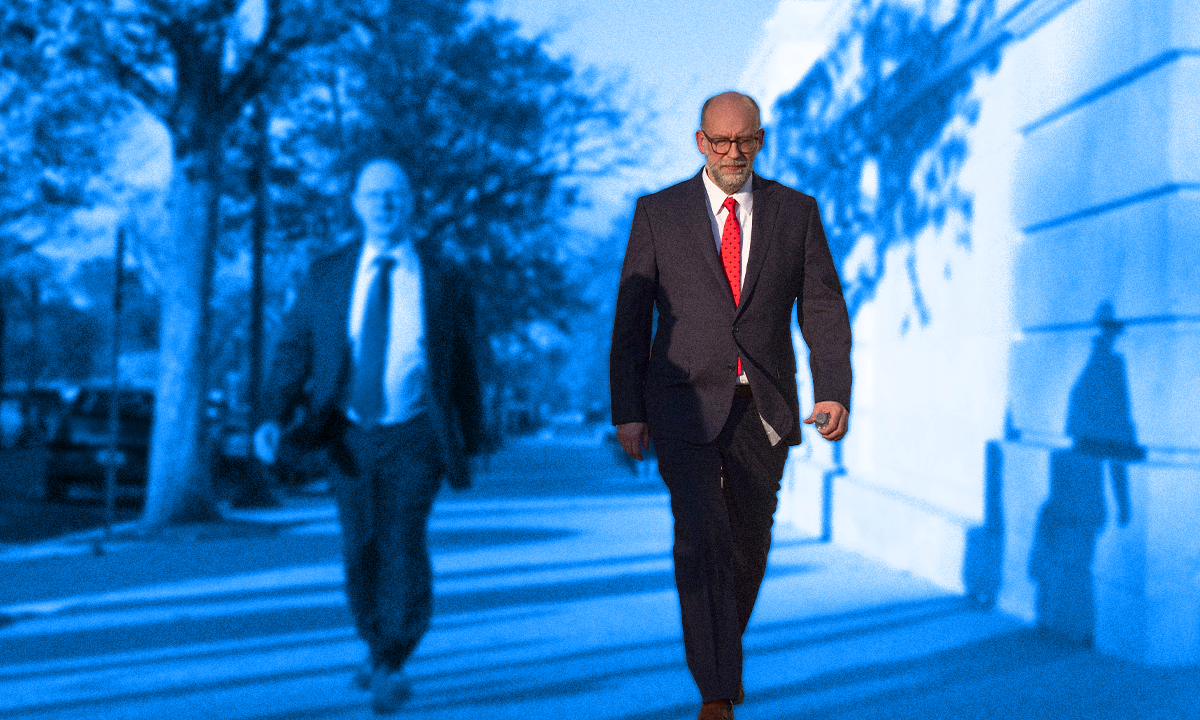The Canary in the OMB Coal Mine
Russ Vought’s freedom to run the Office of Management and Budget will serve as a gauge of Trump’s commitment to the most radical elements of Project 2025. Russell Vought, right, President-elect Donald Trump's pick to be the director of the Office of Management and Budget. (AP Photo/Mark Schiefelbein)
Russell Vought, right, President-elect Donald Trump's pick to be the director of the Office of Management and Budget. (AP Photo/Mark Schiefelbein)
After running for president on the theme of retribution, Donald Trump appears committed to following through on his campaign promise to “destroy the deep state.” The president-elect has assembled a team of political arsonists who are determined to burn down large swaths of the federal government. Barring any surprises, most of his nominees will likely sail through confirmation in the Senate, where Republicans hold a 53-47 majority.
Across the board, Trump’s appointees share the president-elect’s hostility toward the agencies and departments they have been tapped to lead. For some, this hostility is rooted in ideology; for others, partisan loyalty. Kash Patel, Trump’s pick for FBI director, appears to be driven by both, while sharing Trump’s obsession with vengeance. As a loyal foot soldier driven by resentment toward “deep state” elites and a singular focus on pleasing the boss, Patel has promised to use his power to “find the conspirators” in the government and go after journalists who “helped Joe Biden rig presidential elections.” Like President Richard Nixon’s notorious henchman Chuck Colson, who put together the infamous “enemies list” and once boasted that he would “walk over my own grandmother to reelect Richard Nixon,” Patel is ready to do whatever it takes. Like Colson, he has compiled his own enemies list, but unlike Colson, has published it for the world to see.
If confirmed by the Senate, there is no question that Patel will try to weaponize the nation’s top law enforcement agency against Trump’s legion of “enemies.” Yet the damage caused by a fervent and unqualified loyalist like Patel may ultimately pale in comparison to the damage inflicted by the more experienced ideologues such as Russell Vought — the wonky “Christian nationalist” best known for his ties to the right-wing group Project 2025. Though Trump repeatedly disavowed the Heritage Foundation-led group during his campaign, he has since dropped the act. Transition officials have begun reaching out to some of the names found in Project 2025’s massive personnel database, while the president-elect has already tapped several of the group’s top contributors to leadership positions.
Under Russell Vought, the Office of Management and Budget will lead the effort to “dismantle” the administrative state.
Vought himself will be returning as director of the Office of Management and Budget, which he led during the last two years of Trump’s first term. The OMB might not seem particularly important when compared to a sprawling agency like the FBI, but under Vought it will lead the effort to “dismantle” the administrative state and root out all “disloyalty” from the federal bureaucracy. In an essay for Project 2025’s 900-page policy book, Vought described the OMB as the president’s “air-traffic control system,” with the director representing the “best, most comprehensive approximation of the President’s mind as it pertains to the policy agenda.” As an advocate of the “unitary executive theory,” Vought explicitly rejects the idea of any kind of agency independence, even for those agencies that Congress explicitly designed to be insulated from partisan politics.
Vought is prepared to deploy all levers of presidential power to help Trump “destroy” the deep state, including some that are technically illegal. While the OMB’s main function is to produce the president’s budget and conduct regulatory reviews throughout the executive branch, it is also responsible for distributing funds that have been appropriated by Congress to federal agencies and programs. Under current law, the president is barred from unilaterally withholding funds — a practice historically known as “impoundment.” But Trump has vowed to restore this power and has described it as a “crucial tool with which to obliterate the deep state.” Importantly, he has the full backing of his future budget director. Indeed, Vought already showed his willingness to impound funds during his first run at the OMB, when the office withheld foreign aid to Ukraine in order to pressure Ukrainian President Volodymyr Zelenskyy into investigating Joe Biden. This action ultimately led to Trump’s first impeachment, and the Government Accountability Office later determined that the OMB had violated the 1974 Impoundment Control Act, which prohibited presidential impoundment.
That 50-year old law was passed in response to Nixon’s partisan abuses of the power. Nixon’s predecessors used impoundment sparingly, but the 37th president threatened to withhold funding from entire programs and as much as 20% of the discretionary budget. Vought will likely urge the new president to adopt a similarly aggressive approach in order to take their fight to the Supreme Court, where a sympathetic 6-3 conservative majority could uphold the president’s impoundment powers. With Vought in charge of the funds, impoundment could be used to target various agencies and government programs that benefit lower-income and working-class Americans. The main targets of Vought’s plan can be found in a 10-year budget proposal he circulated last year to Republicans on Capitol Hill, which called for cutting $2 trillion from Medicaid, more than $600 billion from the Affordable Care Act and $400 billion from the food stamp program. Vought also proposed slashing the budgets for the State Department, the Department of Labor and many other agencies.
In addition to impoundment, Vought will probably help Trump implement his executive order, known as “Schedule F,” that empowers the president to potentially purge the civil service. In the waning months of his first term, Trump signed an executive order that promised to reign in the federal bureaucracy and root out “rogue bureaucrats” who the president and his allies had long complained about. The order itself created a new category in the federal workforce that exempted all employees working in “confidential” or “policy determining” areas from civil service protections. Depending on how broadly this order was interpreted by agency heads, it could have impacted anywhere from 50,000 to hundreds of thousands of career employees. Though President Biden rescinded the order, Trump has vowed to reinstate it immediately upon taking office.
The ultimate scope of Schedule F will depend on how it is interpreted, and in a recent interview with Tucker Carlson, Vought said that it should be “viewed maximally” by agency heads. As director of OMB, Vought “stretched the definition of ‘policy related’ to the point of absurdities,” in the words of president of the National Treasury Employees Union, Doreen Greenwald, whose union obtained documents showing that Vought was planning to move nearly three-quarters of OMB’s workforce to Schedule F. Such a broad interpretation could impact tens of thousands of employees in every agency. “If employees moved to Schedule F are removed entirely,” warned Greenwald, “they’ll be replaced by unqualified partisans, or they’ll stay knowing they can be fired at will, while we’re left with malfunctioning agencies and the rapid deterioration of the merit-based civil service.”
Joe Spielberger, policy counsel at the Project on Government Oversight’s Effective and Accountable Government team, told me that Schedule F is “likely to impact almost every aspect of the federal civil service, with potentially grave consequences to the government’s ability to provide basic services and benefits and its willingness to serve in the best interest of the people.”
“We want to put them in trauma.”
That is exactly the point. In private speeches obtained by ProPublica in October, Vought clearly laid out his plans to aggressively target government employees and make their jobs impossible. “When they wake up in the morning, we want them to not want to go to work because they are increasingly viewed as the villains,” he said. “We want their funding to be shut down so that the EPA can’t do all of the rules against our energy industry because they have no bandwidth financially to do so. … We want to put them in trauma.”
With the zeal of an inquisitor, Vought is determined to inflict an historic blow to the “administrative state” and its more than 2 million employees. In this mission, he has powerful allies like billionaires Elon Musk and Vivek Ramaswamy, who Trump has tapped to oversee the gimmicky advisory group called the “Department of Government Efficiency.” Though the broligarch duo have promised to cut trillions of dollars in federal spending by “radically downsiz[ing] the size, scope and mission of the federal government,” they won’t actually be working in the government or have any formal powers. But their slash-and-burn agenda will have influential supporters like Vought inside the administration, whispering kind words to the boss.
It is not without irony that the one person who may be in a position to thwart or limit this reactionary agenda is Trump himself, who is hardly a libertarian ideologue or a fiscal hawk. The president-elect is motivated primarily by self-interest, more interested in lining his pocket and weaponizing the government than waging an ideological war to “deconstruct the administrative state.” During his first term, Trump often ignored or rejected Vought’s suggestions for deep cuts to social programs and entitlements. When the president backed a second stimulus check, the budget director was beside himself. Ultimately, Trump rejected these cuts because he understood how deeply unpopular they would be with most Americans, including his own supporters.
This time around, Vought has friends in high places who will vocally support his aggressive approach to budget-cutting, though it remains to be seen whether Trump will be willing to go quite as far as he — or Musk — would like. Vought’s agenda can be found in the 900-page Project 2025 policy book to which he contributed. One can only hope that Trump meant at least some of what he said this year when he disavowed the right-wing group’s ideas as “absolutely ridiculous and abysmal.”
Your support is crucial…With an uncertain future and a new administration casting doubt on press freedoms, the danger is clear: The truth is at risk.
Now is the time to give. Your tax-deductible support allows us to dig deeper, delivering fearless investigative reporting and analysis that exposes what’s really happening — without compromise.
Stand with our courageous journalists. Donate today to protect a free press, uphold democracy and unearth untold stories.






You need to be a supporter to comment.
There are currently no responses to this article.
Be the first to respond.